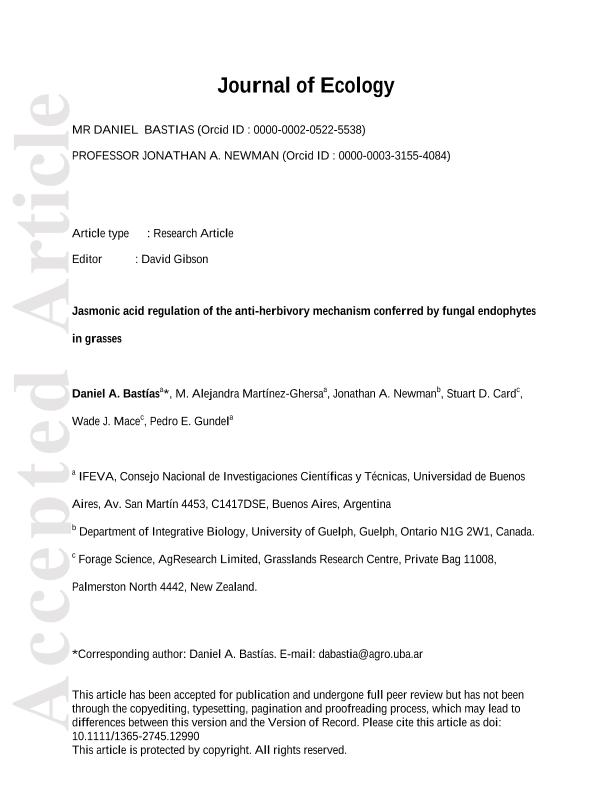Artículo
Jasmonic acid regulation of the anti-herbivory mechanism conferred by fungal endophytes in grasses
Bastias Campos, Daniel ; Martinez-Ghersa, Maria Alejandra
; Martinez-Ghersa, Maria Alejandra ; Newman, Jonathan A.; Card, Stuart D.; Mace, Wade J.; Gundel, Pedro Emilio
; Newman, Jonathan A.; Card, Stuart D.; Mace, Wade J.; Gundel, Pedro Emilio
 ; Martinez-Ghersa, Maria Alejandra
; Martinez-Ghersa, Maria Alejandra ; Newman, Jonathan A.; Card, Stuart D.; Mace, Wade J.; Gundel, Pedro Emilio
; Newman, Jonathan A.; Card, Stuart D.; Mace, Wade J.; Gundel, Pedro Emilio
Fecha de publicación:
11/2018
Editorial:
Wiley Blackwell Publishing, Inc
Revista:
Journal of Ecology
ISSN:
0022-0477
Idioma:
Inglés
Tipo de recurso:
Artículo publicado
Clasificación temática:
Resumen
The most studied mechanism of protection against herbivores in grasses associated with Epichloë fungal endophytes has been the fungal production of alkaloids. However, the contribution of the plant immune response on the level of resistance to herbivores in symbiotic grasses has been poorly explored. We studied the relationship between the plant hormone, jasmonic acid (JA) and Epichloë fungal endophytes on herbivore defences in symbiotic grasses. We hypothesized that an exogenous application of methyl jasmonate (MeJA), an activator of the plant JA defence response, would increase the level of resistance of endophyte-symbiotic and non-symbiotic plants to a chewing insect. As Epichloë endophytes produce alkaloids, an enhancement of the JA defence would complement the resistance given by these alkaloids. Lolium multiflorum plants symbiotic and non-symbiotic with the endophyte Epichloë occultans were subjected to an exogenous application of MeJA followed by a challenge with the generalist chewing insect Spodoptera frugiperda. We measured the level of plant resistance to chewing insects, and the defences conferred by host plants and fungal endophytes. Symbiotic plants were more resistant to S. frugiperda than their non-symbiotic counterparts. However, despite the fact that the concentration of JA significantly increased in all plants exposure to MeJA, neither endophyte-symbiotic nor non-symbiotic plants showed an enhanced resistance to insects. Unexpectedly, the exposure of endophyte-symbiotic plants to MeJA led to a reduction in the concentration of loline alkaloids (i.e. N-formyllolines and N-acetylnorlolines), consequently decreasing the level of plant resistance to the herbivore. Synthesis. Our results suggest that, rather than complementing the alkaloid-based defence, the jasmonic acid hormone weakens the anti-herbivore mechanism conferred by Epichloë endophytes. The present study highlights that the interaction between the jasmonic acid hormone and the presence of leaf fungal endophytes can be of importance for the effectiveness of the anti-herbivore defences of symbiotic plants.
Archivos asociados
Licencia
Identificadores
Colecciones
Articulos(IFEVA)
Articulos de INST.D/INV.FISIOLOGICAS Y ECO.VINCULADAS A L/AGRIC
Articulos de INST.D/INV.FISIOLOGICAS Y ECO.VINCULADAS A L/AGRIC
Citación
Bastias Campos, Daniel; Martinez-Ghersa, Maria Alejandra; Newman, Jonathan A.; Card, Stuart D.; Mace, Wade J.; et al.; Jasmonic acid regulation of the anti-herbivory mechanism conferred by fungal endophytes in grasses; Wiley Blackwell Publishing, Inc; Journal of Ecology; 106; 6; 11-2018; 2365-2379
Compartir
Altmétricas



